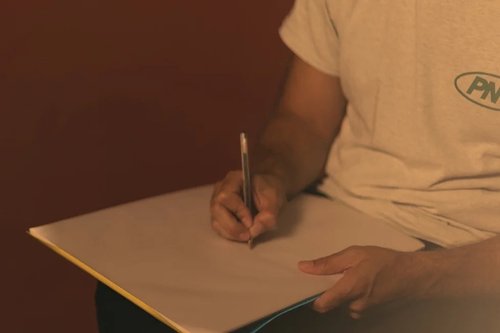Job interviews: how to use storytelling to make a strong impression
May 05, 2021
5 mins


Journaliste indépendante.
What makes for a memorable applicant? A recruiter might see a dozen applicants for the same position. Soon, one “dynamic and motivated” recent graduate can start to seem just like another “dedicated and proactive” recent graduate. Those who make an impression don’t necessarily have an exceptional career path or a list of qualities that would make the Bachelor blush behind his TV-strength makeup. The ones who make an impression are those who know how to tell the best stories.
Stories are the oldest form of sharing. When they are personal, they are an extremely powerful means of communication. So how do you employ your best anecdotes in an interview? And how do you tell them so well that you grab the recruiter’s attention? Here are some tips.
Stories: the Swiss Army knife of a job interview
An inspiring, engaging, and memorable good story has many facets and can achieve as many objectives.
To highlight your strengths
Do you think that you are hardworking, creative, and have an analytical mind? Well, so do the 10 applicants before you. But a story can provide proof of those attributes. “My parents work in the restaurant business and I started to help out at a very young age,” said Emma, a journalist. “I often tell the story of how I used to follow my days at school with evening and weekend shifts, during holidays and exam periods. It’s my way of proving that I can work hard and roll up my sleeves when needed.”
To connect with the recruiter
Telling a personal story is also a good way to get closer to the person you are talking to. “For a long time, I would manage to slip in the story of my ‘marathon from hell’ in Asia, in 30°C weather, wearing a pair of Stan Smith trainers,” said Christophe, a marketing manager. “I would exaggerate a bit and play up the humor to lighten the mood. It obviously lets me show that I’m not afraid of challenges. But, above all, it helps me to create a bond with the recruiter. There are so many marathon runners and Sunday joggers out there. I have a 90% chance of hitting the bull’s eye. It’s a bit like saying, ‘I love Blackadder, Johnny English, or Dwayne “The Rock” Johnson. It brings people together.”
To break away from first impressions
First impressions are formed quickly, some within a few seconds of the initial contact. Telling an anecdote can help you to override the image you may be projecting if that is what you want. “When I was a student, I used to work as a cleaner for companies at night,” said Bastien, a financial controller. “I often share this experience to show that, beyond the image of the ‘confident guy in a suit’, I am also humble and I know what it’s like to get up at 4 AM to clean toilets.”
The ingredients of a good story
Scientist Paul J Zak has been investigating the power of stories on the brain. His research has shown that a good story triggers the production of two hormones: cortisol, which keeps the brain alert, and oxytocin, the feel-good and empathy hormone. A good story grabs the attention of the person you are talking to and creates a connection with them. But how do you choose the right story to trigger this happy cocktail of hormones?
A story that respects the ‘law of proximity’
The law of proximity is commonly used by the media to grab their audience’s attention. It reflects the fact that people connect more strongly to a story that is “close” geographically, chronologically, or emotionally.
A story related to your interview
A good anecdote should reflect a value, a moral, or a message that is relevant to the job for which you are applying. But it should also be consistent with the company’s culture.
A story that makes you look good
Of course, you want the recruiter to remember you, but not at any cost. Avoid racy anecdotes, which are rarely appreciated. And if your story focuses on a failure you experienced, remember to emphasize the lessons you learned from it.
The three keys to good storytelling
There is more to the art of storytelling than simply beginning with “Once upon a time”. Florent Ploujoux, a public speaking expert and co-founder of YA+K, a coaching company, shares his tips for successful storytelling.
1. Understand your audience
“Although it is unlikely that you will get to know the recruiter personally, finding out about their job and the culture of the company can give you some insight into the person you’re meeting,” he said. If you know the name of the person who will be conducting the interview, take a look at their LinkedIn profile to see if there are any areas you have in common with them.
2. Choose a storytelling structure
A good story is a well-constructed one. It allows the recruiter to follow the story without getting lost and keeps their attention until the end. “Two classic storytelling structures generally work well in interviews: the hero’s journey and converging ideas. They are used differently, depending on the effect you want to achieve,” said Ploujoux. “The hero’s journey is the classic structure of Disney cartoons. An initial situation is disrupted by an external element, a character––in this case, the applicant––gradually rises to the rank of ‘hero’ to return to the initial situation with a new status. It can be used to tell the story about an internship or a trip where you encountered difficulties and came back changed. Converging ideas is the name of the structure found in the documentary film Tomorrow. The principle? Two or three stories converge with the same message [in this case about the future of the planet]. In interviews, this means that each story should support a stance or set of qualities that make you the best candidate for the job.”
3. Appeal to the five senses
“Telling a story is about giving the audience an experience. Descriptions should be specific enough to allow the listener to identify with it,” he said. There is no need to launch into the War and Peace of descriptions, but you should help the listener to immerse themselves, alongside you, in the story by adding details about smells, appearances or noises: “I was doing my homework on an old wooden table, with the sound of my brother finishing the washing up in the background,” you might say.
“But above all, be concise,” said Ploujoux. “A story can follow a precise narrative outline, even in a few sentences.” If your interviewer wants to dig deeper, they will ask for it. And if you’ve managed to win them over, you’ll have plenty of time to give them more details once you’re on the job.
Create your own catalog of stories
It is not always easy to remember a relevant anecdote. Stories tend to fade into the background of our memories. In an article published on the Harvard Business Review website, Nancy Duarte, an American writer, speaker, and chief executive, gives some tips to help you to bring your stories to the surface.
First, take a notepad and write down the names of people, places, and objects that are important to you. For each one, think about the emotions they evoke. This should gradually help you to bring up memories that you can summarize in a sentence.
Then arrange these stories into a personal catalog, which you can turn to when you need to find inspiration. This catalog is not a tool that you can build all at once. Come back to it regularly to add to it.
If you can, categorize your stories by the themes, situations, morals, and values they highlight. This will help you when you need to find the right story to tell for your interview.
Take a look online at the speech Steve Jobs gave to students graduating from Stanford University in 2005. Or check out Bono’s commencement speech at the University of Pennsylvania in 2004. Great speakers captivate with their charisma, but they also make their speeches memorable through their ability to tell a story. A good story is one that is relevant to a given situation and illustrates a specific point to reach a particular audience. Some are perfect for making your mother-in-law laugh at a dinner party, others for impressing a recruiter at a job interview. In any case, you don’t need to have traveled the world and lived a thousand lives to captivate an audience. Any event, even the most mundane, can be transformed into a memorable adventure, as long as the story is told well.
Translated by Kalin Linsberg
Photo: Welcome to the Jungle
Follow Welcome to the Jungle on Facebook, LinkedIn, and Instagram, and subscribe to our newsletter to get our latest articles every day!

More inspiration: Prepare for a job interview

Hybrid work goals: How to nail the negotiation in your next job interview
Want a hybrid work setup? Learn how to research, negotiate, and showcase the benefits of flexibility during your next job interview.
Dec 19, 2024

The secret to interview success? That annoying colleague
Got a story about a difficult coworker? Good! That office drama might just be your ticket to acing your next interview.
Dec 16, 2024

Is flexibility the key to “having it all” as a parent?
Balancing a career and parenthood can be challenging, but with the right approach, it’s possible to achieve both.
Oct 08, 2024

Slacker vs. control freak: What’s your interview style?
We’ve all been there: whether you're overly anxious or effortlessly cool—what best describes you?
Sep 24, 2024

Overcoming neurotypical norms during the job hunt
Neurodiverse individuals bring valuable innovation and should be more included in the workplace. How can we embrace their unique talents?
Sep 23, 2024
The newsletter that does the job
Want to keep up with the latest articles? Twice a week you can receive stories, jobs, and tips in your inbox.

Looking for your next job?
Over 200,000 people have found a job with Welcome to the Jungle.
Explore jobs